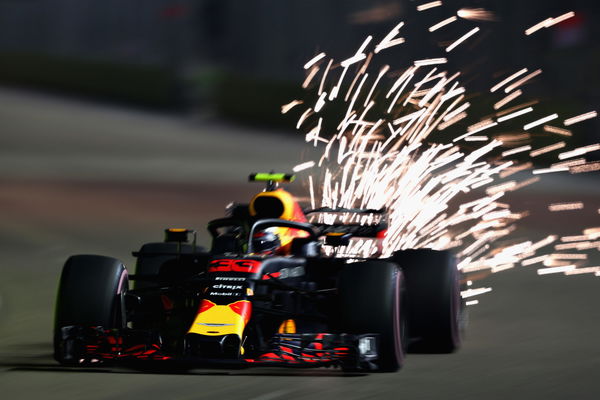
via Getty
SINGAPORE – SEPTEMBER 15: Sparks fly behind Max Verstappen of the Netherlands driving the (33) Aston Martin Red Bull Racing RB14 TAG Heuer on track during qualifying for the Formula One Grand Prix of Singapore at Marina Bay Street Circuit on September 15, 2018 in Singapore. (Photo by Lars Baron/Getty Images)

via Getty
SINGAPORE – SEPTEMBER 15: Sparks fly behind Max Verstappen of the Netherlands driving the (33) Aston Martin Red Bull Racing RB14 TAG Heuer on track during qualifying for the Formula One Grand Prix of Singapore at Marina Bay Street Circuit on September 15, 2018 in Singapore. (Photo by Lars Baron/Getty Images)
For the first time, F1 teams will have a budget cap to adhere to during the 2021 season. This will see a seismic change in the landscape of the World Championship.
The chief reason of introducing the budget cap is to create a cost-effective Championship. It would also improve the long-term financial stability of the teams and the sport. This will also level the financial playing field of all the teams.
ADVERTISEMENT
Article continues below this ad
The budget cap for the 2021 season has been set at 145 million dollars. This will see a five million decrease year on year until 2023, when it is set at 135 million. There is a provision that states that if the inflation is above three percent, the cost cap can be increased further.
How the F1 budget cap will be policed and the punishments given
Will Buxton explained that, in order to implement and regulate the budget cap. The sport will set up a designated department.
“Overseeing all this, a Cost Cap Administration Department of the FIA has been set up in Geneva. The teams will have to submit an interim set of accounts every June, and that will cover the period from January-April. Full accounts will be due before the next season begins. So, March 2022 is when the accounts will be delivered for the 2021 F1 season.”
Burton went on to talk about the different breaches and their respective penalties. He said, “We’ll start with the smallest, which is a procedural breach, and that essentially is submitting your tax return late, which like the rest of us will mean the teams will get a financial penalty.”

via Reuters
2019 FORMULA 1 SINGAPORE AIRLINES SINGAPORE GRAND PRIX (19 September 2019) – Zone 1 – Paddock Club – Drivers’ Autograph Session Alfa RomeoÕs Kimi Raikkonen and Antonio Giovinazzi Singapore Grand Prix via Reuters Plus
The 39-year-old explained the different overspend breeches. He said, “Beyond procedural breaches are overspend breaches. There are 2 divisions: Minor Overspend, in which a team spends more than budget cap but within 5%, and then there is the Material Overspend, which is anything over 5%.
“Now the minor overspend will result in what is being termed as a minor sporting penalty. This can be anything from a reprimand to a points deduction, a race ban, a reduction in the cost cap for the following year, or even a limit on wind tunnel time.”
ADVERTISEMENT
Article continues below this ad
“Material overspend, so more than 5% of the budget cap, will result in any and multiple of those penalties being applied plus potential exclusion from the F1 World Championship. These are new financial regulations are being taken very seriously.”
Why the budget cap should be good for the sport?
This budget cap would be highly beneficial for the future of the sport; this would give all the teams an equal chance at competing every weekend. Currently, the field is skewed in favor of big-budget teams like Mercedes. Their higher development budget gives them a distinct advantage over the rest of the competition.
ADVERTISEMENT
Article continues below this ad
With these regulations in place, midfield teams can compete for race victories. They could also possibly compete with the big budget teams for Championships. The bottom-places teams can be more competitive than they are right now.
ADVERTISEMENT
ADVERTISEMENT
ADVERTISEMENT
ADVERTISEMENT

